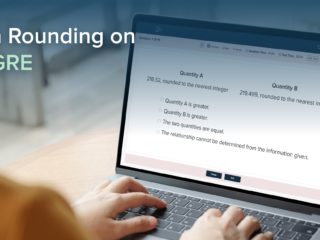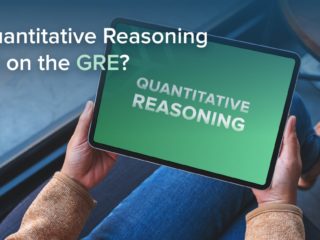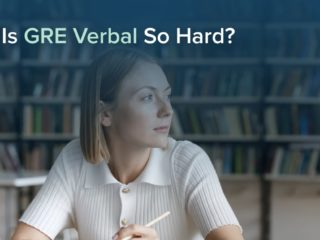Last Updated on April 21, 2023
It is all too common for students to convince themselves that they are terrible at math GRE questions or “just not math people” in general. Unfortunately, this lack of confidence becomes a self-fulfilling prophecy, as these students often score far lower on the GRE than they would have if they had revised their thinking regarding how math skills are gained.
If, instead, these students believed in the power of hard work and perseverance in gaining math proficiency, as most experts who study math education do, these students could set themselves up for higher GRE scores, better degrees, and more sought-after jobs.
It’s true that GRE math is hard, but guess what? Anyone can master it. You just have to be willing to put in the work. In this article, we’ll look at scientific research that busts 2 common myths about math aptitude and give you 3 essential GRE math tips to unlock your full potential on the GRE.
It’s true that GRE math is hard, but guess what? Anyone can master it. You just have to be willing to put in the work.
- Myth 1: Some People Are Just “Terrible at Math”
- Myth 2: Some People Are Just “Math People”
- How to Learn Math for GRE Quant: 3 Essential Tips
- Tip 1: Transform Pessimistic Self-Talk
- Tip 2: Outwork Your Peers
- Tip 3: View Discomfort as Growth
Myth 1: Some People Are Just “Terrible at Math”
Most GRE students who have convinced themselves that they’re simply “terrible at math” formed that conception of their math abilities long before they began studying for the GRE or even thought about sitting for the exam. If you’re one of those people, perhaps you weren’t as interested in math as you were in other subjects in school, or you didn’t perform as well on SAT math as you did on SAT verbal.
Maybe you even went into your first GRE practice test feeling sure that you would bomb the Quant section, and — surprise, surprise — your prediction came true. So what? If past performance could perfectly predict future performance, how would anyone ever change, grow, or develop new skills?
The thought that you’re inherently bad at math is just as illogical and self-limiting as the thought that you’re inherently bad at piano or inherently bad at ping pong. How does someone become skilled at piano? By putting in the time. By working very hard. How does someone become skilled at ping pong? By practicing for hours and hours. So, how does some become skilled at math? You guessed it: hard work and hours of focused practice.
The thought that you’re inherently bad at math is just as illogical and self-limiting as the thought that you’re inherently bad at piano or inherently bad at ping pong.
Psychologists at Columbia University and Stanford put the harmful myth of being “bad at math” to the test in 2007. In a study of nearly 400 seventh-graders over a 2-year period, the researchers found that students who believed that intelligence could be developed saw increases in their math grades over that time, while students who believed that intelligence was fixed saw no change in their math grades. So, although belief alone is certainly not all you need to increase your math knowledge and skill, there is some solid science out there showing that a belief that there is a ceiling on your abilities could put a ceiling on what you actually achieve.
There have been similar findings in other research into human intelligence and learning. For instance, a substantial body of evidence shows that IQ — long thought to be unchangeable — can change fairly significantly over one’s lifetime and is closely linked to factors such as number of years in school, training in new and complex tasks, and consistent practice. Furthermore, changes in IQ don’t necessarily take years; they can happen in months, or even weeks.
If your IQ can increase with studying and practice, why can’t your math skills, and for that matter, your GRE Quant score?
Myth 2: Some People Are Just “Math People”
The flipside of the myth that some people are just bad at math is the myth that others are “math people.” It’s easy to assume that GRE math is a breeze for other people, because you don’t see the many steps they have to take on the road to a great GRE Quant score — the late nights of studying, the dozens of hours in one-on-one tutoring sessions, the Saturdays spent taking practice exams. You don’t see the three lackluster attempts at the GRE before they finally hit their score goals, or any of the painstaking effort and sheer determination that went into the final result.
And you know what? Sometimes people want to make the process of learning math for GRE Quant look easy. I’m sure you’ve read the stories online of people who took some practice tests or brushed up on their math skills for a few weeks and scored 170 on GRE Quant. But do you know those people’s histories? Do you know whether their parents emphasized math study throughout their childhoods, or whether they have jobs that require the use of basic math every day?
Take Tiger Woods, for example — he makes playing golf look like second nature. The fact is, Tiger started practicing his swing when he was 2 years old, and he honed his golf skills over decades and thousands of hours. Of course, none of those things mean that Tiger Woods has no innate golf talent or that every two-year-old who picks up a golf club will become the next Tiger. However, is it so farfetched to think that, with enough practice and dedication, that person could probably become skilled enough to win a golf championship?
You don’t have to be a prodigy or someone who has “always” had a certain skill in order to learn that skill and learn it well. Likewise, you don’t need to be a math whiz in order to earn a great GRE Quant score. Correctly answering GRE Quant questions takes advanced analytical reasoning skills, but the actual math concepts to know for GRE Quant questions are no more advanced than high school level. Do you need innate talent to learn high school math, or do you simply need to put in the work and have confidence in your ability to learn new things?
You don’t need to be a math whiz in order to earn a great GRE Quant score.
If you had the experience of not performing as well in math classes as some of your classmates did, you might have assumed early on that their higher grades or perfect test scores were the result of “natural” math abilities. It’s easy to make such assumptions because they do the double work of explaining the situation and providing a convenient excuse. Those other students are just better at math than you are! They’re math people! The thing is, if you believe that you’re not a math person, you probably won’t put in as much effort when studying math or preparing for math tests, because you feel that your situation is hopeless.
If you don’t put in as much effort, even subconsciously, then your performance actually will suffer. As you continue to underperform in math — for reasons you may not realize — you get confirmation of your beliefs. The pattern repeats, and the tale you’ve told yourself about not being a math person becomes reality.
How to Learn Math for GRE Quant: 3 Essential Tips
We know that there is plenty of reputable scientific data showing that self-limiting beliefs such as “I’m terrible at math” or “I’m not a math person” can affect learning and performance. Now, that doesn’t mean that earning a high GRE Quant score is just a matter of having the proper mindset. Adjusting your mindset is the first step on the road to mastering GRE Quant, not the last.
If you think you’re doomed to be terrible at math GRE questions, these 3 GRE math tips will be essential to your success:
- Tip 1: Transform pessimistic self-talk
- Tip 2: Outwork your peers
- Tip 3: View discomfort as growth
Let’s break down each of these strategies one at a time.
Tip 1: Transform Pessimistic Self-Talk
In my more than a decade of experience coaching GRE students, I’ve found that students who score well on the GRE tend not to engage in pessimistic self-talk, self-talk such as “I’m too bad at math to make significant improvements,” or “GRE math is so hard that I’ll never be able to solve Quant problems fast enough,” or “I’m just terrible at math GRE questions.” Instead, students who earn high scores on the GRE are logical, realistic, optimistic, and goal-oriented when it comes to their current skills and the time and effort required to reach their target scores. Their self-talk is more akin to the following:
Currently, I need to improve my math skills, but with time and hard work, I can make the improvements I need.
I may not be fast at answering GRE Quant questions right now, but I have the ability to get better and faster each day, and that is exactly what I’m going to do.
GRE math is hard, but I’ve learned to do difficult things before and I’m up for the challenge.
No one is denying that GRE math is hard, but MANY students who eventually earned top GRE Quant scores started out struggling with GRE math. As the research we looked at earlier indicates, when you are optimistic about learning something, you are more open to the information and more likely to absorb it. Attitude also plays a significant role in your well-being throughout your months of GRE preparation.
If you’re grumbling every time you sit down to study, you’re going to be chronically stressed and unhappy. That stress can erode your ability to concentrate and make your GRE study time less productive. In fact, studies show that positive self-talk improves performance on timed math problems and standardized tests.
To become more confident in your ability to learn GRE math, keep the old saying in mind, “fake it ‘til you make it.” Engage in some positive, confidence-boosting self-talk before you sit down for each study session, and if you catch yourself falling back into pessimistic self-talk as you’re studying concepts, working through practice questions, or quizzing yourself with flash cards, stop and put a more optimistic spin on your thoughts.
Remind yourself that what you’re doing in that very moment is helping you improve your math skills. Try to think of learning GRE Quant as a fun challenge. You’ll probably be surprised by the readiness with which GRE concepts start to stick.
TTP PRO TIP:
Engage in some positive, confidence-boosting self-talk before you sit down for each study session and do a quick reset if pessimistic thoughts start to creep in.
Tip 2: Outwork Your Peers
At the beginning of this article, I mentioned that anyone willing to put in the work can perform well in GRE Quant. The thing is, the work of mastering GRE math is generally two to three times the amount of work that most students expect to put in when they start studying for GRE.
There is a silver lining on that cloud, however: When it comes to GRE Quant, you can outscore your peers by outworking them. If your peers are studying GRE math for 100 hours, study it for 200 hours, and you’ll be about twice as skilled as they are in GRE math. If your peers are studying GRE math for 200 hours, study it for 300 hours, and you’ll be about 50 percent more skilled than they’ll be.
Not convinced that such a one-to-one correspondence exists? Scientific research shows that training has a “dosage-dependent” effect on people’s ability to learn, to reason, and to solve new problems. In other words, the more you train, the more you improve. The fact is, people who score high on the Quant section of the GRE are not inherently or genetically talented at math; they simply learned more about math and honed their skills more than their peers did.
If you haven’t yet mastered GRE math, consider that you may need more time. If the hours you’ve put in aren’t enough, put in more hours. When you finally sit for your exam, your work will be apparent.
TTP PRO TIP:
If, for example, your peers are studying GRE math for 100 hours, study it for 200 hours, and you’ll be about twice as skilled as they are in GRE math.
Tip 3: View Discomfort as Growth
One of the key aspects of outworking your peers is perseverance, and persevering often means not being deterred by setbacks, dealing with discomfort, and not getting thrown off your game when things are tougher than you expected they would be or when your progress is slower than you hoped it would be.
Over the years, I’ve noticed that the students who typically earn the highest GRE Quant scores are the ones who don’t immediately throw in the towel when the going gets tough during GRE practice. On the other hand, students who tend to give into their discomfort and give up on practice questions after one minute, or 1:30, or some other brief time frame, are the ones who tend to see the smallest increases in their GRE scores.
You have to learn to push through GRE Quant questions even when you feel frustrated and tired and overwhelmed, and you’d rather be doing anything else. If instead of quitting you keep at it and go through the fire – the questioning yourself, the feelings of anxiety, boredom, anger, or whatever else – generally, you will arrive at the answer, or you’ll at least learn what to do the next time you encounter a question of that type.
Conversely, if you never allow yourself to feel truly uncomfortable, and never give yourself the chance to work past that feeling, you won’t benefit from the learning and growth and muscle memory that goes along with those experiences.
In fact, you should strive to make discomfort part of your GRE preparation until you get to a point at which nothing about the GRE shakes your determination and resolve. The truth is, sitting for the GRE is uncomfortable in itself — the test center environment, the hours spent staring at a computer screen, the time pressure. There is basically nothing comfortable about it. If you use your GRE math study as training for being uncomfortable, that will give you a further advantage on test day and make you that much more prepared for the rigors of the exam.
To give yourself those chances to be uncomfortable, it’s important to work on GRE Quant practice questions untimed until your math skills improve. You may initially look at a GRE math question and not know how to answer it. You may be unsure of whether you have the knowledge to find the answer. Well, finding the answer may take more than 2 or 3 minutes. So, by giving yourself just 2 or 3 minutes, you’re letting yourself off the hook.
You’re not learning the essential GRE skill of going through the fire and emerging on the other side with the answer. Simply going to the explanation to get the answer does not teach you how to hack and persist and do whatever it takes to get the answers to questions that challenge you. It’s an uncomfortable process, but if you want to increase your GRE Quant score, it’s a necessary one.
Research suggests that when people think they’ve put in their full effort on a task, they’ve actually done around 40 percent of what they’re capable of. So, when you’re solving GRE Quant practice questions, don’t give up unless you are truly, inescapably stuck. Even if you don’t get a question right after sticking with it, you’ll be teaching yourself how to be resilient and persevere in the face of adversity, and those are skills you’re definitely going to need when you sit for the GRE.
TTP PRO TIP:
The discomfort of sticking with challenging questions is essential to mastering GRE Quant, so work on practice questions untimed until your math skills improve, and don’t give up on questions unless you’re truly stuck.
The consensus is loud and clear: You CAN work your way to strong math skills and an impressive GRE Quant score. Incorporate the 3 GRE math tips I’ve laid out here into your study plan, and check out these GRE study tips to learn faster, learn more, and forget less of what you learn during your GRE preparation.
Let’s do this!!




Thank you for this, excellent commentary. I recently started studying for the GRE and I can relate to a lot of the feeling you describe in your article.
I hope this article has inspired you to tackle GRE math with confidence! Many of our articles contain valuable strategies for mastering quant, so feel free to look around and reach out to us with any questions.